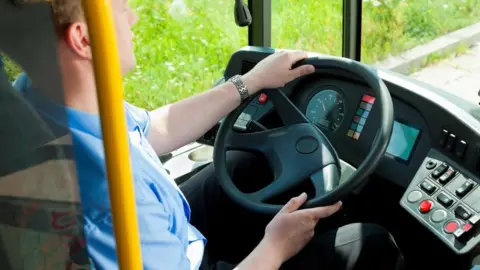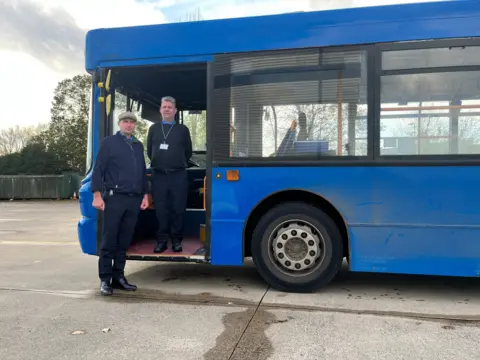Bus driver shortage: Almost 1 in 10 positions vacant
 North Northamptonshire Council
North Northamptonshire CouncilAlmost 1 in 10 bus driver positions are vacant in the UK, driving a drop in the number of services, the Confederation of Passenger Transport (CPT) has said.
The group, which represents operators, is calling on the government to help increase the number of its drivers.
But low pay, long hours and shift patterns that leave drivers "exhausted" remain a barrier, the Unite union said.
The Department for Transport (DfT) said it was working with the industry to attract and train drivers.
The CPT found Scotland had the greatest shortage of bus drivers, with 14% of positions vacant. In England, the West had the largest shortage.
Operators are "running hard to catch-up and fill the vacancies, but that's really difficult when the labour market is tighter than ever before", according to the group.
DfT data shows the number of people employed by local bus operators has been dropping. In March 2022, bus and coach companies employed 94,606 people across England. That is down 16% from March 2011.
This comes as the number of bus journeys are still below pre-pandemic levels. For the year ending June 2022, there were just over three billion local bus passenger journeys in England. That is up 55% from the year before, but is still down from over four billion in 2019.
Pay for bus and coach drivers has also dropped. DfT data shows the median weekly wage in 2021 was £487.80 before tax. Adjusted for inflation, that is down 13% from 2018.
Unite national officer for passenger transport Bobby Morton described the figures as "disturbing but not surprising".
"Until bus companies address the problem of low pay, long hours and shift patterns that prevent workers having a decent family life and leave them exhausted then new drivers won't join the sector and existing workers will leave," said Mr Morton.
Data from the Driver & Vehicle Standards Agency (DVSA) shows 4,096 tests for driving passenger-carrying vehicles (PCVs) were conducted in the year ending March 2022. That is down 56% from five years earlier. During the Covid pandemic's first year, the number conducted dropped to 1,330.
Go-Ahead's Oxford Bus Company plans to offer a £3,000 joining bonus for drivers who already have a PCV licence during a recruitment day this month.
The company told the BBC it was "also seeking specifically to broaden diversity in the bus driving community with recruitment campaigns aimed at women and at ethnic minority communities".
 CPT
CPTPeter Kriel, a trainee bus driver with Stagecoach in Oxford, described joining the profession as the "best decision I've ever made".
His instructor Gemma Harrison said: "I don't think people think of bus driving as a career."
Coach company National Express told the BBC that while it was "currently 7% down on bus drivers", it was offering increased pay, improved flexibility and shorter weeks.
The CPT has called on the government "to work with us to ensure the supply of labour is as big as it possibly can be".
"This might involve encouraging people to return to the workforce or recruiting from overseas, which could include adding bus and coach drivers to the shortage occupation list for a skilled worker's visa," a spokesperson said.
A DfT spokesperson said: "We continue to work with industry as they look to attract and train the workforce they need. To make recruitment easier, we have ramped up the capacity of vocational driving tests, including by bringing in additional examiners."
